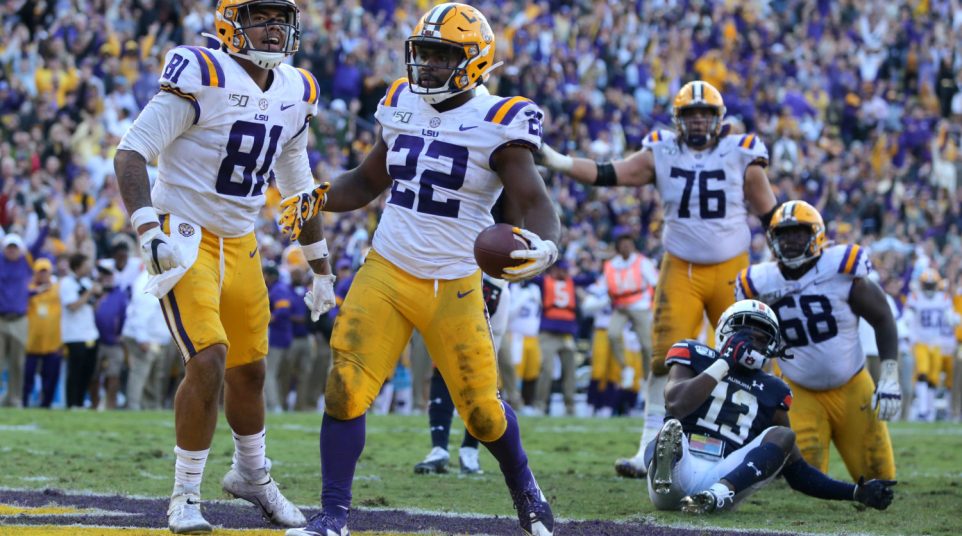
LSU football: Clyde Edwards-Helaire takes over running back stable
LSU was supposed to have a stable of running backs this season.
Coach Ed Orgeron said so.
Somebody forgot to tell Clyde Edwards-Helaire.
Edwards-Helaire has been the featured back since the beginning of the season. He has gotten more and more productive, even as Joe Burrow has rewritten the Tigers’ passing records.
Lanard Fournette saw where this was going and entered the transfer protocol.
Freshmen Tyrion Davis-Price and John Emery Jr. have played here and there, Davis-Price finally emerging as the clear-cut second running back. But a distant second.
Edwards-Helaire has just been too good to leave any opening for anyone else to get much of a chance.
Then came the Alabama game Saturday.
That’s when Edwards-Helaire went from being this year’s bell-cow to being an historic figure among LSU running backs.
He ran hard and moved nimbly. He caught passes. He ran for 3 touchdowns and caught a touchdown pass.
Basically he played Robin to Joe Burrow’s Batman as the No. 2 Tigers strengthened their already compelling case as the best team in the country in a 46-41 victory that gave them control of the SEC West.
Edwards-Helaire now has 786 rushing yards and 11 rushing touchdowns. He has 28 catches after grabbing nine of Burrow’s tosses against Bama – more than any of the half dozen or so future NFL wide receivers on the two teams – for 202 receiving yards and a touchdown.
LSU has had more highly touted running backs in recent seasons, better NFL prospects, runners with more yards.
The Tigers have had a 1,000-yard rusher each of the last six seasons. But Jeremy Hill didn’t participate in a win against Bama in his 1,000-yard season.
Leonard Fournette didn’t participate in a win against Alabama in either of his 1,000-yard season. Derrius Guice didn’t participate in a win against Bama in either of his 1,000-yard seasons. Nick Brossette didn’t participate in a win against Bama in his 1,000-yard season last year.
Edwards-Helaire has a win over Bama – LSU’s first in nine tries – as he sets his sights on a 1,000-yard season, an SEC championship and more.
With regular-season games remaining against Ole Miss, Arkansas and Texas A&M, he has a chance to finish well beyond 1,000 rushing yards and have one of the most memorable seasons any LSU running back has had.
Much has been said and written about the impact that Tigers first-year passing game coordinator Joe Brady has had on Burrow, transforming him from a pretty good college quarterback to the presumptive Heisman Trophy winner in one season.
Brady’s impact on Edwards-Helaire hasn’t been as dramatic, but he has had an impact on him.
LSU routinely uses five players in pass routes and with wide receivers Justin Jefferson, Ja’Marr Chase and Terrace Marshall Jr. routinely making big plays it makes it difficult for defenses to deal with all of them and still have an adequate defender left to assign to Edwards-Helaire.
Brady’s experience with New Orleans Saints coach Sean Payton and quarterback Drew Brees has invited comparisons between one of the NFL’s most consistently productive passing games and the renovated LSU passing game.
In that comparison, Edwards-Helaire plays the role of Alvin Kamara, the former Tennessee running back whose dual-threat productivity running the football and catching it has helped revitalize the Saints offense the last three seasons.
When the season began the expectation was that Edwards-Helaire was going to be the steady, dependable upperclassmen that the Tigers could count on while freshmen Emery and Davis-Price grew into bigger roles.
Perhaps the youngsters will grow into bigger roles, but it’s beginning to look like they won’t get that chance this season.
Edwards-Helaire is a native of Baton Rouge, like Brossette and Guice. Fournette is from New Orleans.
LSU has a history, especially recently, of building its running game around homegrown talent. Edwards-Helaire, like Guice, is a product of Catholic High School,
“He loves LSU,” Orgeron said of Edwards-Helaire. “He’s a hard worker who comes to work every day. Nothing’s too hard for him.”
